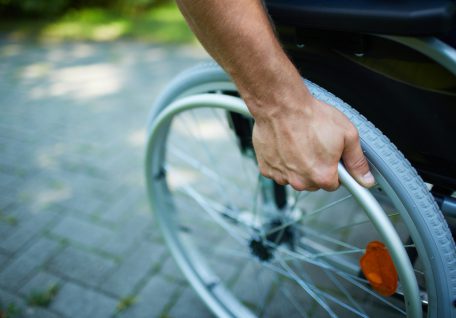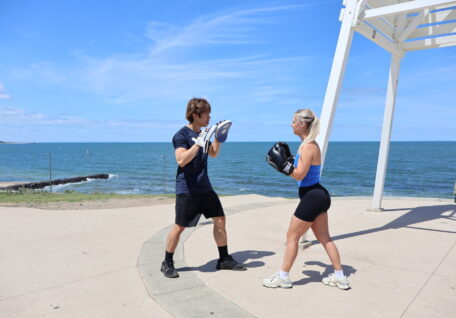Sarah Cantle, a Fitness Lecturer here at AFA, as well as the owner of Metacorr. She’s also an experienced Personal Trainer, and Corrective Exercise Therapist. Sarah competes in bodybuilding competitions and has shared some of her thoughts on bodybuilding with us:
Bodybuilding competitions are all the rage at the moment and the amount of competitors entering has increased rapidly over the last two years, especially female bodybuilding. There is a lot that goes into walking out onto the stage, with preparation taking anywhere from three months, two years or even longer to get the physique and posing perfected. Along with gaining the body you require for stage there are many behind the scene aspects that need to be considered before you enter into your preparation.
1. Body Image – are you ready for this?
This is a competition that focuses on physique, muscle definition, body fat percentage, pose, stage presence and even your hair, make up and outfit. If you’re looking at going into a competition you need to be aware that you will be judged based on your appearance. Every little insecurity that you have about your body image will be enhanced in a large magnitude; even a confident person can become concerned about their body.

2. Research everything
Do your research –many amateur competitors will go into these competitions without knowledge nor understanding of the effects it can have on your body and mind during preparation, on the day and also most importantly after the competition. Make sure you read articles and talk to friends or experienced competitors on all areas, this includes the food you are eating, the supplements you are taking and the training you are doing. Remember there is not just one way that works for everyone; you need to find the way that works for you.
The more you research the better you will understand if your training and nutrition is right for you and your goal. There are so many athletes out there that are not researching what they are told to do. They put all their trust into their coach, only to later realise they stopped seeing results from overtraining, or worse, damage their metabolism or hormone balance.
3. Selecting a coach
Selecting a coach is really important in this discipline; take your time looking for the right coach. If you do select one that you later find out you’re not happy with, you can change at any time.
A coach should cover two main areas: knowledge of training, and ability to assist you with support throughout the process.
When selecting a coach come up with a list of questions that you want to know and see if they answer them correctly. Some of the questions should include:
What style of training do they use?
How often will you see them?
How much do they cost?
Do you offer assistance outside of the PT session?
How do they run peak week?
What support do you offer after comp?
What experience do they have in female bodybuilding for example?
Write down what you expect the answers to be and make sure when you ask the potential coach that they meet your expectations; this process can be hard and you want to make sure you are getting the right support. Once you select your coach try to focus on what they tell you as everyone will have an opinion on what you are doing and all of a sudden become an expert. This leads to mixed messages and confusion with your process – stay focused.
4. Selecting a federation and division
There are many federations in the bodybuilding industry, including INBA, ANB, NABBA, WNBF, IFBB and the WCFF to name a few, and they all have different rules, regulations and expectations for each category. Make sure you research each different federation and if you have the time, get to some of the different shows so you can see what each federation has to offer. You may find that you prefer certain styles of judging or the general setup of a certain federation.
Choosing the division can change throughout your progression of your training, even on the day of the competition you can alter from one category to another. Attending the posing classes that the federations run will allow you to get a better understanding of your body composition and the category you should enter into.
5. Attending posing sessions
You could have the best physique on stage, but if you don’t know how to pose you will lose marks on your stage presence. You may also potentially create a muscular imbalance which will deduct further points.
Federations offer group posing classes, which are a great to get a quick understanding of what is expected from you on the day, however getting private posing lessons will allow you to find positions that suit your body and create better transitions throughout your quarter turns.
This part of the competitions can make or break you, so practice, practice, practice and if you think you have it down pat, practice again.
6. Looking after yourself
Last but not least, look after yourself. Throughout this process, and especially after. The amount of pressure you will put on your body, from training and dieting, can take its toll. Listen to your body throughout the whole process, and if you find that there is something not working for you then speak to your coach and change it.
Trust the process as you will see huge changes in the last couple of weeks. Especially so during peak week; your body will change a lot. Listen to your coach and remind yourself daily that you set this goal and you can achieve it. Self-doubt can sneak into the back of your mind and it’s important to remember why you’re doing this.
The day of the bodybuilding competition is a whirlwind of excitement, nerves and anticipation. All your hard work comes together for this one day; make sure you slow down and take time to allow it all to sink in.
After the competition be kind to yourself as this is where the real challenge begins. The ‘post comp blues’ can sneak up on the strongest person, and can put you into a reverse cycle of depression and lack of confidence – make sure you continue to eat clean, keep training but at a reduced intensity and frequency, set new goals to do with life, business or adventure and lastly make sure you talk to your friends and family about your feelings.











